Exclusive! Director Swaroop RSJ: Mishan Impossible may be a kids' film but it's also for adults who keep the child within them alive
The filmmaker looks back at his formative years, the various factors that convinced him to enter the film industry and the many challenges of making Mishan Impossible
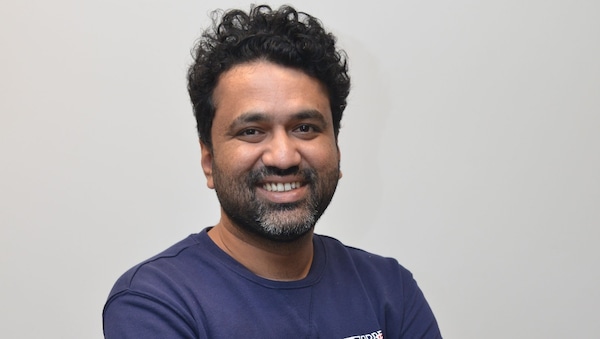
Last Updated: 02.42 PM, Mar 31, 2022
Writer, director Swaroop RSJ, who made a fantastic debut with the thriller comedy. Agent Sai Srinivasa Athreya is hoping to surprise audiences yet again with another refreshing, unconventional story revolving around three kids on a mission to catch Dawood Ibrahim. Yes, that forms the core plot of the filmmaker's upcoming release, Mishan Impossible, a story based on a true incident about kids in Bihar many years ago.
The title is a reference to the headline published in the newspaper then, but with a twist (Mission is spelt as Mishan). In an interaction with OTTplay.com, Swaroop takes us through his evolution as a storyteller and the many challenges of making a kids' film that appeals to adults.
Films weren't part of the initial plan
I was born in Nellore, spent quite a bit of my early years in Sriharikota and later shifted base to Tirupathi, completing most of my education there. I was an Electronics student, took up a corporate job later. Films, dramas were a major part of my life, I wrote a lot of stories but never had the idea to become a director. In 2012, there was a film club in Infosys, Mysore and we did a lot of short films every week within 48 hours. I directed a few ads too, equipped myself with the craft across various departments - cinematography, editing et al. I loved this phase and began enjoying the process. I always believed one should take up a career in a field where they lose themselves in the process and enjoy it fully.
When I decided to pursue films as a career, I didn't want to take up the regular route of joining as an assistant to someone else and learning the ropes of filmmaking. However, I made it a point to be prepared fully when I was taking this leap of faith. I was being serious about my short films, aware of the technicalities of storytelling. Only when I was reasonably confident, with three bound scripts in my hand and had an inkling that it was the right time to chase my dreams, did I quit my job.
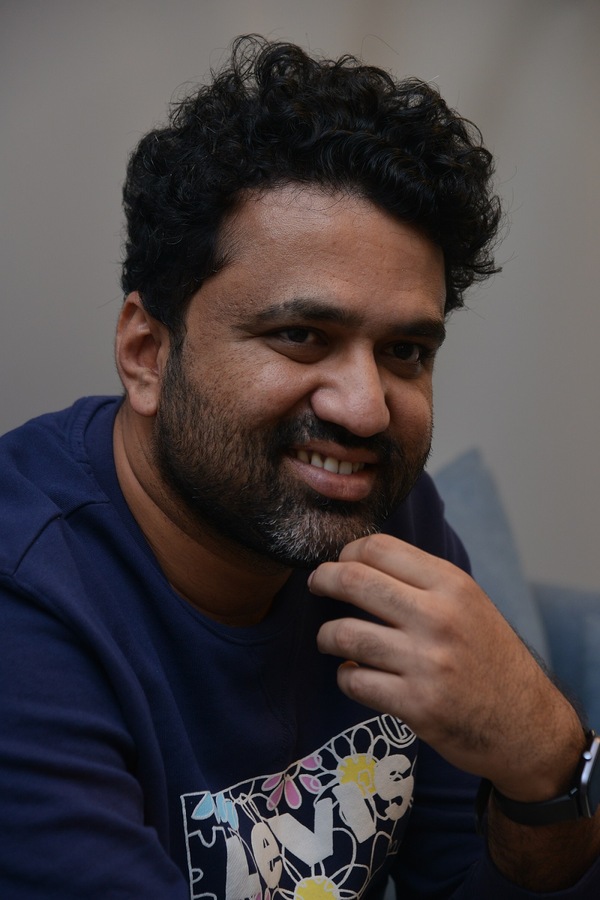
Handling daily realities and practical problems of filmmaking
While doing short films, managing your friends and extracting performances from them is very easy. On the first day of Agent Sai Srinivasa Athreya, I was dealing with 80-100 people, none of them whom I've known or worked with, before. Not many were listening to me and handling people as a newcomer was very tough. I just couldn't do it. It took me time to realise that it's the director and the cinematography who decide the mood on sets. We took a break after a couple of days of shoot and felt that we had to rethink the process and the approach.
One can neither be a friend nor shout at the top of their voice to extract work. It's an art in itself. Only on the fourth day, did we manage to control the set and learnt about dealing with people daily. There will be a problem on the sets every day, although it's your first or tenth film, and it boils down to how you handle the problem with composure.
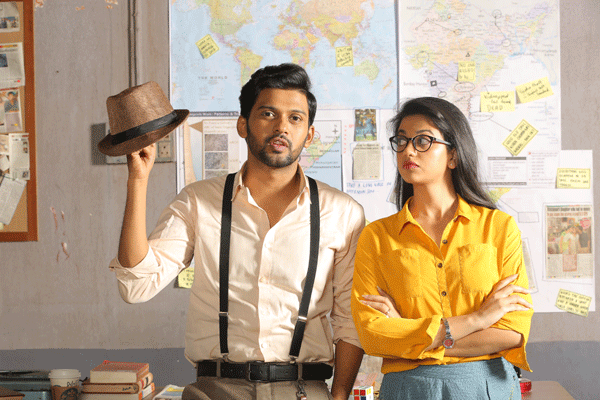
Co-writing his first film with actor Naveen Polishetty
Before we finalised Naveen for the role, we realised it's a very dramatic character - one can't go over the top or underplay it too much. It was a very thin line and working with a new actor for it is an equally huge challenge. From day one, I was particular that the film needed a good actor, who had a good sense of comic timing.
I used to watch a lot of AIB shows back then and felt Naveen was a good choice. The core story was already in place while he came but I thought of reworking the comedy portions as per his body language. One may enjoy and laugh about a scene on paper but it's important to see if it would work with a particular actor. We both worked for over six months on the script and went on board.
His conviction while making Mishan Impossible
The seed of Mishan Impossible was sown in 2015 and I had begun writing it even before Agent Sai Srinivasa Athreya. The film is a fictionalised version of a real incident in Bihar. I didn't view the subject as a risk. When I quit my corporate job for a career in films, I truly believed that audiences will accept a film whenever we tell it honestly. I had a similar approach for my first film too when most of my friends asked me to play safe by choosing a romance or a comedy. It was a long time since a detective's story was told in Telugu cinema and audiences took a liking to it because I was sincere with the storytelling. Whatever I do, big or small, honesty in the execution is most important to me.
Handling the tricky balance between humour and thrills
I always believed that looking at an issue in a lighthearted vein was my strength since my short film days. One of my short films for instance was based on a call-centre executive. We generally give it back to them when we receive a call and get back to our work. What would be life from his end? How does he handle the pressure of making so many calls even on his birthday? My short film was based on that theme and I dealt with the situation in a very funny way. It has influenced the way I approach every story and subconsciously itself, I try to balance the humour and story aspect without diluting either of them.
Recreating the small-town ambience for Mishan Impossible and how it's different from Agent Sai Srinivasa Athreya
While Agent Sai Srinivasa Athreya was set in Nellore, a town, Mishan Impossible unfolds in a village backdrop. Having known Nellore for long, its architecture and infrastructure well gave me familiarity with my first film. The visual ambience in the village in Mishan Impossible is quite different from the world in Agent Sai Srinivasa Athreya. I always like to place a character in an unfamiliar/unusual situation - like a goon in a medical college, a detective in a small town. When three innocent boys land in a situation they can't even grasp hold of, you get Mishan Impossible. You can call it my style/filmmaking signature.
Extracting performances from children without being too demanding
We shot for the film mostly in the outskirts of Hyderabad. It was important for me to forge a bond with children because I need to work with them throughout the film and they are the main characters in the film. After 6 pm, we had to go back to Hyderabad every day. Instead, we took a manduva house where I, my assistants and also people from the cinematography department, stayed with the kids. Every day after the shoot, we spent time listening to their mimicry, them singing and had great fun till 9.30 pm.
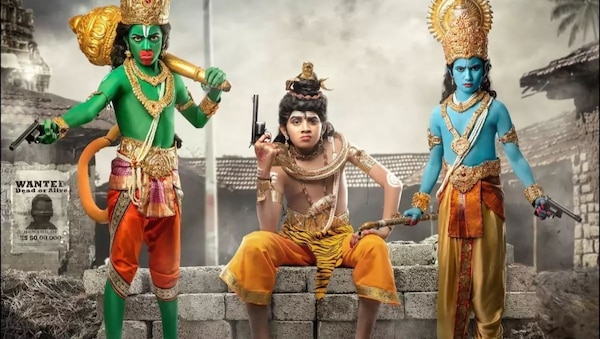
This ensured intimacy on sets and they identified with us, as one among their own. I had to correct them only two-three times during the entire shoot. All I had to do was to act and show, which is not generally my way of going about things. For instance, I discussed scenes with Naveen for an hour or a little more for Agent Sai Srinivasa Athreya but never showed him how to go about it.
This was a major difference but the children always came to the set prepared and knew their lines a day in advance. Mishan Impossible relies on their innocence, they had to be casual and luckily they never went overboard. On a few occasions where they went overboard, I had to delicately handle the situation, subtly put the idea forward to them and if not, hang out with them, explain it over a casual chat. It was a refreshing exercise for me as well.
Retaining the innocence of children in films
That was on my mind while making my first film too. A lot of children in our films speak lines like, 'Akka, baava vastunnadu' and it's hard to imagine them speaking beyond their age, without any trace of their innocence. Till a while ago, there was an innocent side to children even in their mid-teen years; probably films and the digital age also have some part to play with the loss of their innocence.
It's a little disturbing to see children from their third grades trying to talk like adults. Even with the auditions for the film, the child artistes were behaving like lead actors already, mouthing lines like 'narikesta..podichesta'. We picked actors who had a unique personalities and did a 60-day workshop before the film took off. In Mishan Impossible, the kids played by Harsh Roshan, Bhanu Prakash and Jayateertha Molugu, remain innocent, right from start to finish even going through extreme situations. I like Little Soldiers, Taare Zameen Par even today because the kids behave as per their age.
Bringing Taapsee on board for the film
We were worried that audiences would consider Mishan Impossible a Taapsee film, especially while noticing her presence on the poster. For the same reason, through the trailer, we made it clear to audiences that it was a film revolving around kids. Taapsee isn't seen in the trailer beyond a few shots. Most of them watch the trailer before coming to a film and we had to be upfront that Mishan Impossible is a kid's film. The couple of songs we released don't have Taapsee in them. I hope it drives home the point.
Initially, we had conceived her part as a male but we felt it was getting a little too similar in the zone of Agent Sai Srinivasa Athreya and thought of changing it into a female character. Going by Taapsee's choices in the recent past, I was confident she would be keen on taking up a strong character. I was a little hesitant if she would accept a role that lasted only for 40 minutes in the film. She liked the story instantly, wanted to be a part of a good film and never bothered about its screen-time.
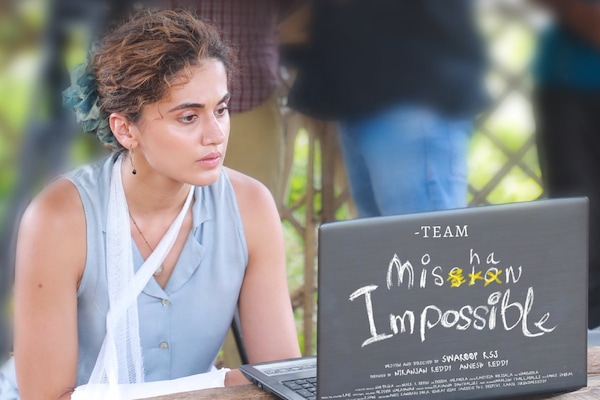
While writing the character of a journalist, who was a male initially, it was easy for me to understand his body language. When it became a female character, handling the histrionics and the animated characterisation of the part became a challenge. We had to alter a lot of aspects during the shoot when we realised that a woman wouldn't react to a particular situation a certain way - from their body language to the way they dress or talk.
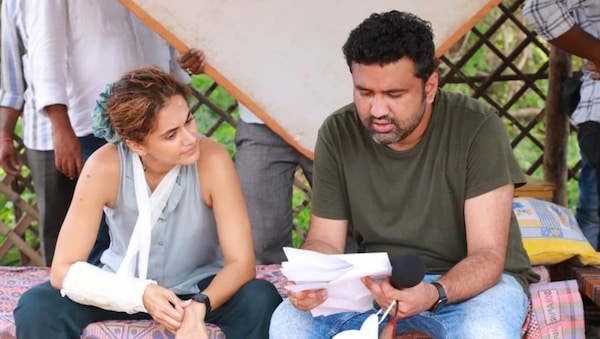
What about it was exactly tricky? I can probably explain it better once you watch the film. It's very tough to write a good female character. Agent Sai Srinivasa Athreya revolved around a male character and Mishan Impossible too is about three boys and I had it easy with them. But, writing a pivotal female character that's crucial to the story of Mishan Impossible was difficult. While Taapsee was practising the scenes, I could figure out if the character was working or not.
The USP of Mishan Impossible - in a nutshell
Anyone who wants to watch a good film will not miss Mishan Impossible. Don't come to the theatre thinking it's a kids' film. The film is aimed at kids and adults, in whom the child is very much alive.
Subscribe to our newsletter for top content, delivered fast.

